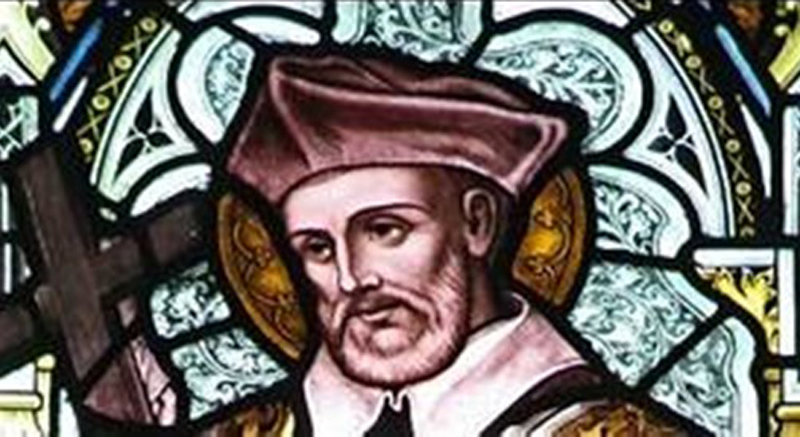(1515-1595)
Philip Neri was born in Florence on July 21, 1515. As a child he was known for his cheerfulness and obedience. In fact, he was referred to as “good little Phil.” He received his early teachings from friars at the Dominican monastery in Florence, San Marco.
At 18-years-old, while living with a wealthy relative for the purpose of learning the family business, he experienced a mystical vision, which he eventually spoke of as his Christian conversion. This event was an encounter with the Lord, and it dramatically changed his life.
He lost his interest in owning property or participating in business. He felt a call from the Holy Spirit to radically live for and serve the Lord. He moved to Rome and became the tutor for a fellow Florentine’s sons. His success with the boys proved Philip’s special talent with human relationships and in bringing out the best in people.
In 1535, Philip began studying theology and philosophy. Although he was considered a “promising scholar,” after three years of studies, Philip gave up any thought of ordination. He set out to help the poor people of Rome and to re-evangelize the city, which had seemed to have lost its Christian values.
Philip had a knack for starting up conversations and leading his listeners to consider a new and better way of life, the Christian Way. He began talking to people on street corners and in public squares; he made acquaintances in places where people commonly gathered. With his warm personality and incredible sense of humor he encouraged groups of people to gather for discussions, studies, prayer, and the enjoyment of music. His customary question was always, “Well, brothers, when shall we begin to do good?”
Philip would lead his followers to hospitals to wait on the sick or to the Church, to pray to and encounter Jesus Christ. Philip was an evangelist. He loved to share the Gospel and help people to find or rediscover their faith in Jesus Christ. His days were dedicated to helping others, but his nights were set aside for solitude spent praying in the church or in the catacombs beside the Appian Way.
In 1544, on the eve of Pentecost, Philip saw what appeared to be a globe of fire. It is said the fire entered his mouth, causing Philip to feel his heart dilate. Philip was filled with such paroxysms of divine love that caused him to scream out, “Enough, enough, Lord, I can bear no more.” Philip then discovered a swelling over his heart, though it caused him no pain.
In 1548, with the help of his confessor, Father Persiano Rossa, Philip founded a confraternity for poor laymen to meet for spiritual exercises and service of the poor, the Confraternity of the Most Holy Trinity. Hiss sincere mission and appealing nature won him over friends from all societal levels, including that of Ignatius of Loyola, Pius V and Charles Borromeo.
At 34-years-old, Philip was ordained to the diaconate and then to the priesthood on May 23, 1551. Before sunup, until sundown, Philip spent hours sitting and listening to people of all ages. Sometimes Philip broke out informal discussions for those who desired to live a better life. He spoke to them about Jesus, the saints, and the martyrs. He thought of going to India to join the foreign mission field but was dissuaded by his peers because Rome still needed Philip’s ministry and influence.
A large room was built above the church of San Girolamo to tend to Philip’s growing number of pilgrims and other priests were called on to assist him. Philip and the priests were soon called the “Oratorians,” because they would ring a bell to call the faithful in their “oratory.”
The foundation of the Congregation of the Priests of the Oratory would be laid a few years later with members who encouraged others to deepen their faith. Philip’s rule for them was simple – share a common table and to perform spiritual exercises. Philip didn’t want his followers to bind themselves to the life with a vow and he did not want them to denounce their property.
Philip’s organization was officially approved by Pope Gregory XIII in 1575. In the words of one of his biographers, Philip was “all things to all men…. When he was called upon to be merry, he was so; if there was a demand upon his sympathy, he was equally ready…” Philip was respected and loved throughout Rome; he became a trusted advisor to popes, kings, cardinals and equally as important to the poor.
On the Feast of Corpus Christi, May 25, 1595, Philip was told by his physician that he was not healthy. He had not looked well for 10 years. Philip realized his time had come to pass on to the Lord. For the remainder of the day, he listened to confessions and saw his visitors as normal.
Before heading off to bed, Philip stated, “Last of all, we must die.”
About midnight of May 26, 1595, Philip had a hemorrhage and died at 80-years-old.
Adapted by A.J. Valentini from: Online, C. (n.d.-b). St. Philip Neri – Saints & Angels. Catholic Online. Retrieved May 19, 2021, from https://www.catholic.org/saints/saint.php?saint_id=97
